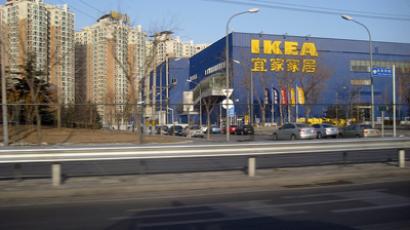Mighty China a boon and concern for Russia’s distant east
The Amur region is thousands of kilometers distant from Moscow and merely five minutes by boat from China. Unsurprisingly, the influence of its fast-developing neighbor is felt all over the region.
High heels and a hard hat – it is not a look many women can pull off. But then Li Lihua, or Larissa as she prefers to be called in Russia, is no ordinary woman. Having first arrived in the Russian Amur region as an interpreter in the early 1990s, she and her family worked their way up from running a small café to owning this large construction company.Spread across the region’s capital, Blagoveshchensk, are no fewer than four large Chinese restaurants owned by the Li family. They are full most nights and serving up a taste of the Orient to Russian diners. It is an impressive portfolio, and one that the mother-of-two says she could not have built in China.“I saw an opportunity to create something here. Russia needs skilled laborers and with China being so close I had easy access to Chinese goods, equipment and a ready workforce," says Li Lihua.Lihua/Larissa is just one of a growing band of successful Chinese entrepreneurs operating in Russia’s Far East, where the Amur River is all that separates the two countries. Easy proximity coupled with favorable visa regulations inspire thousands of Chinese workers to flock across the border every year.One of the tried and tested business models is selling cheap, second-hand Chinese clothes. Whether it is a pair of trendy trainers or some designer sunglasses you are after, the people of Blagoveshchensk know they can pick up a bargain or two at this Chinese market. Of course everything in there bears the label “made in China” and all the sellers also come from China. It was absolutely packed inside on the day RT came to visit, and apparently the situation is the same every single day. Clearly, business in booming.“I’ve been here for three years. I left China as there were not enough jobs. Things are going well here,” one market trader said.“You can get things really cheap here which is great if you've got a large family. The quality varies hugely but on balance I think we’re lucky to have Chinese traders here – Russian goods just can’t compete on pricing,” a Russian customer told RT.By hopping on one of the many packed ferries that cross the Amur River every day, Russian consumers can enjoy an even more authentic Chinese shopping experience – albeit with a slight Slavic flavor. They are keen for a bargain and in the process, help to fuel the Chinese economy.It has lead some to fear that Russia’s Far East is being exploited by its entrepreneurial neighbor. Local government officials disagree.“Pessimists revel in self-pity at the site of China forging ahead, while optimists think of ways to develop Blagoveshchensk at the same pace using Chinese expertise, capital and labor. I believe our region is hugely fortunate to border China. If we compare our city to others in Russia, we’re much better off in almost every respect,” says Igor Gorevoy, the region’s minister for foreign economic ties, labor and the consumer market.Officials speak of extensive plans for more joint ventures and greater integration between the two countries. As far as government is concerned, it is a relationship worth strengthening.Due to the importance of communication with China, learning Chinese is becoming routine for the citizens of Blagoveshchensk, Ekaterina Chirkova from the Confucius Institute told RT. “Learning Chinese is a usual thing here in Blagoveshchensk as we are located very close to China, so more and more people, not only young people but also grown-ups, older generations, strive to learn Chinese,” she said. “Of course, it is very useful as we have a lot of opportunities to go traveling, shopping, doing business with China.”From the Amur coastline China is so close that you almost feel like you can reach out and touch it. People living there say they have been witness to the phenomenal pace of development along the skyline, representative of the growth of the Chinese economy as a whole, and its influence here in Russia.














